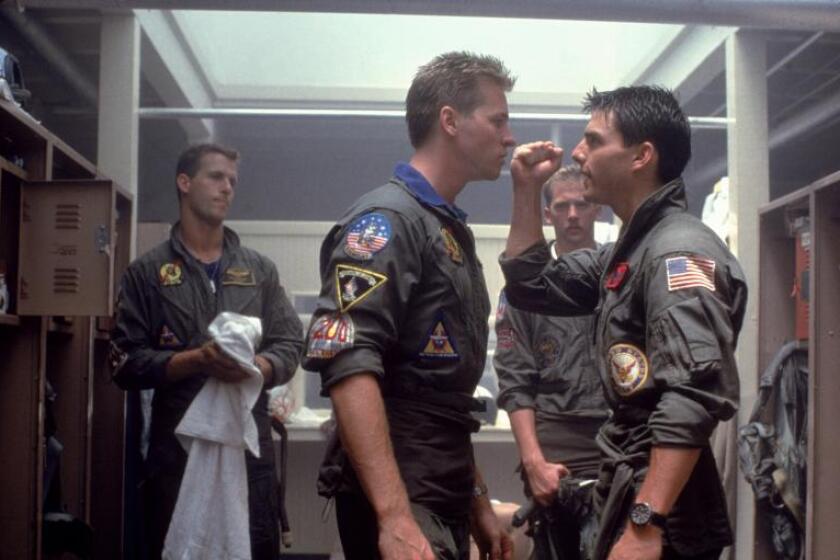‘Cienaga’: Sharp Look at Life Mired in Decay
- Share via
“La Cienaga,” a subtle yet acute observation of upper-middle-class decay, marks an impressive and decidedly challenging feature debut for Argentine writer-director Lucrecia Martel. Drawing inspiration from her own large family, Martel sets her story in a hot and humid February mainly in rural northwest Argentina at a country estate, where indolence, self-absorption, sexual longing and easily overlooked youngsters intermingle to create a sense of foreboding that proves prophetic.
The film opens strikingly with lots of people, mainly adults sunning themselves around a fetid swimming pool behind a large, rambling Spanish-style house. The hostess, Mecha (Graciela Borges) is an attractive but worn middle-aged woman. When she drunkenly stumbles, cutting her upper chest with shards of her broken tumbler, she does not elicit immediate response as she lies prone by the pool. The slow reaction time to her predicament is unnerving.
Mecha does end up in the hospital, and in no time her best friend Tali (Mercedes Moran), to whom she is distantly related, is heading from the fairly distant city of La Cienaga (The Swamp) to Mecha’s bedside.
Mecha is a woman losing her grip as she slips into alcoholism. She has banned her husband Gregorio (Martin Adjemian) from their bed because his home hair-dye job is rubbing off on the pillows. Her glamorous friend Mercedes (Silvia Bayle) has moved on from Gregorio as a lover to the next generation, the couple’s son Jose (Juan Cruz Bordeu). Her daughter, Momi (Sofia Bertolotto), has a crush on the maid Isabel (Andrea Lopez), who bears the brunt of Mecha’s angry desperation.
To Mecha, servants are automatically los indios (the Indians), which meansto her that they are lazy, slow or downright unresponsive to orders and above all are “spoiled.” Tali may find Mecha worth caring about, but she is nevertheless a condescending, class-conscious racist.
When Tali arrives with her husband Rafael (Daniel Valenzuela), devoted when he’s not absorbed in hunting, this means that her four small children plus Mecha’s considerably older four children add up to lots of people--and lots going on, much of it all too easily overlooked. No wonder Mecha eagerly suggests that she and Tali go off to Bolivia for a quick vacation, never mind a precarious political situation brewing.
Martel eschews exposition entirely, placing considerable demands upon the cast. This is in keeping with her brisk, succinct, economical style, even if this approach makes lots of arguably unnecessary work for the viewer in figuring out who’s who and how everyone is connected.
Martel’s sharp observations of the foibles of human nature are expressed perfectly in the telling images of cinematographer Hugo Colace and tight editing of Santiago Ricci. Mecha and others are momentarily distracted from their self-preoccupation from a breaking story on TV about a young woman who experiences a vision of the Virgin Mary, who appears to her on the side of a of water tank. This running story ultimately connects with Martel’s abrupt, shattering ending of “La Cienaga,” as startlingly illuminating as a flash of lightning.
*
Unrated. Times guidelines: Complex adult themes and situations.
‘La Cienaga’
(The Swamp)
Graciela Borges: Mecha
Mercedes Moran: Tali
Martin Adjemian: Gregorio
Juan Cruz Bordeu: Jose
A Cowboy Pictures release for Code Red of an Orfeo Films International presentation of a 4K Films production. Writer-director Lucrecia Martel. Producer Lita Stantic. Cinematographer Hugo Colace. Editor Santiago Ricci. Art director Graciela Oderigo. Set designer Cristina Nigro. In Spanish, with English subtitles.
In selected theaters.
More to Read
Only good movies
Get the Indie Focus newsletter, Mark Olsen's weekly guide to the world of cinema.
You may occasionally receive promotional content from the Los Angeles Times.










